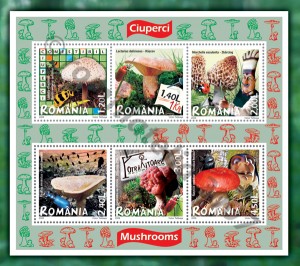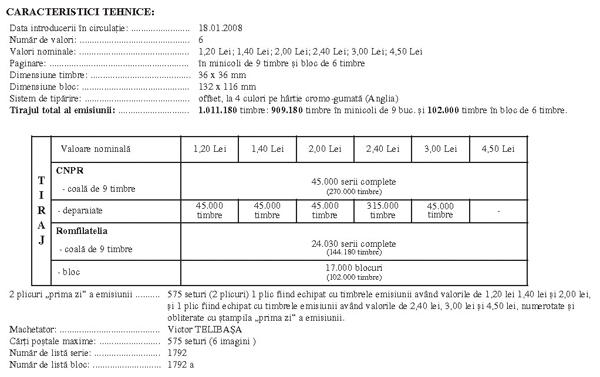 Romfilatelia, the specialized company in editing and trading Romanian postage stamps introduces into circulation the postage stamps issue Mushrooms.
Romfilatelia, the specialized company in editing and trading Romanian postage stamps introduces into circulation the postage stamps issue Mushrooms.
This issue presents 6 species of mushrooms, edible and non-edible. Romfilatelia, the specialized company in editing and trading Romanian postage stamps introduces into circulation the postage stamps issue Mushrooms.
This issue presents 6 species of mushrooms, edible and non-edible.
Lepiota rhacodes, is presented on the stamp with the face value of RON 1.20. It is an edible big-medium sized mushroom, growing on the soil, either solitary or in groups. Its cap reaches 10 to 20 cm across, it is spherical or ovoid, smooth, grey-brown. Its cylindrical stem reaches 10 to 15 cm height and 1 to 3 cm thick, it is white and turns red-brown when bruised. Its fertile part is soft, fragile is cap and woody stem. It has a powerful smell and a pleasant taste. It grows on lawns, in the gardens, on arable soils, in conifer or deciduous forests, or clearings.
Lactarius deliciosus, presented on the stamp with the face value of RON 1.40. It is an edible, small-medium sized mushroom, lively colored, growing on the soil in groups. Its cap is thick and pulpy, has a diameter of 5 – 16 cm; its convex to vase shape, inrolls when young and after a while it resembles a funnel, extremities twisted downwards. Its cylindrical stem is 3 to 8 cm high and 1,5 to 2 cm thick, has the same color as the cap, eventually turning green. The mushroom is white or yellow, soft and fragile; air contact turns it to orange, then green. It has a pleasant flavor and a sweet-bitter taste. It grows in conifer woods, always in the mountainous regions. It can be harvested from June to October.
Morchella esculenta, is presented on the stamp with the face value of RON 2.00. It is an edible big-medium sized mushroom, the fertile part looking like a cap. It grows on the soil, either solitary or in groups. Its cap has 4 to 8 cm across and 8 to 15 cm height. It is either conical or ovoid. The general color of the cap is grey or grey-black, then
turning into honey yellow. Its stem is 3 to 7 cm tall and 2 to 3 cm thick, fragile, empty inside, cylindrical, straight to the bottom and a bit thickened. Its fruiting body is white, fragile having a pleasant flour smell. It grows on sandy and humid soils, in conifer or deciduous forests, clearings, forest glades, gardens, or on the side of the roads. It can be harvested from April till the beginning of June.
Paxillus involutus, is illustrated on the stamp with the face value of RON 2.40. It is a non-edible, medium sized mushroom growing solitary on the soil. Its cap is either yellow or brown turning reddish-brown upon touch. Its stem is typically 6 to 8 cm high, 1 to 3 cm thick. It is cylindrical, supple, filled, tough, sometimes curled and its color is lighter than the cap. The fertile part is fragile, yellowish turning redish-brown when cut. It smells like fruit and has a sour taste. It can be found in conifer or deciduous woods, in bushes or gardens. It can be harvested during the summer and autumn seasons.
Gyromitra esculenta, is presented on the stamp with the face value of RON 3.00. It is a non-edible, big-medium sized mushroom, its aspect distinguishing it from most other ordinary mushrooms. It grows solitary or in groups. Its cap has a fertile undefined shape, abundantly lobed, generally brain-like. The size, shape, and position of every lob on the cap help characterize the species. The edges of the cap are linked to the stem. It is brown-reddish, ochre, or dark brown. The cap is 3 to 10 cm across and 3 to 8 cm height. The cylindrical stem is 3 to 6 cm high 2 to 3 cm thick, either smooth or wrinkled. The fertile part for both cap and stem looks like fragile wax. It grows in large groups, in conifer forests, sandy soils, but it can also be harvested in deciduous forests. It is commonly widespread in April but it can also be harvested in March as well as summer months.
Russula emetica, is presented on the stamp with the face value of RON 4.50. It is a non-edible, small or medium sized mushroom. Its cap is generally bright red or purple pink but it can sometimes be reddish–brown or reddish-yellow. Its cap has 4 to 7 cm across. Its stem is white, sometimes showing a slight pink shade. Its cylindrical stem is smooth, thick, soft, and frail reaching 4 to 8 cm height and 1 to 2 cm thick. The fertile part is white, fragile, a sharp disgusting smell. It grows on the soil, either solitary or in groups, during summer and autumn, in conifer or deciduous woods, usually on humid soils.
Issue date: 2008-01-18









